- Home
- Vicki Delany
A Scandal in Scarlet Page 10
A Scandal in Scarlet Read online
Page 10
He came into the kitchen and gave Violet a hearty pat and me a deep kiss. In that order. Then he threw a plastic bag onto the table. I opened it to see a first-edition copy of The Valley of Fear. “We’re done with most of the items donated to the auction and are returning them to their owners.”
“You found nothing?”
“Either our killer wasn’t interested in the items, or they were interrupted before they could lay their hands on what they were after. Everything on the list was present and accounted for, and Leslie Wilson says nothing appears to have been disturbed. We didn’t bother to fingerprint the auction items—there would have been far too much to go through. Some of them must have been handled many times by many different people. Ready for a walk?”
He spoke to me, but Violet barked her agreement.
Ryan took my free hand as we walked down the street. He didn’t say anything, and I let the companionable silence stretch as long as he wanted. When we reached a small local park, I let Violet off the leash. Ryan and I sat on a picnic bench under a huge old maple and watched her rush about, sniffing at the base of every tree. This wasn’t a leash-free park, but she was good enough to return to me at a call, and no one else was around at dinnertime on a Sunday. I kept one eye on her in case she left a deposit that needed to be gathered up.
Ryan put his arm around my shoulders, and I leaned into him. “Tell me what you learned today,” he said.
“Learned?” I asked innocently. “About what?”
“The Kathy Lamb case—what else?”
“Why do you think I learned anything?”
“Because you’re Gemma Doyle. And before you go any further, I should tell you Maureen spilled the beans.”
“What beans?”
“Louise and I paid a call on her earlier. We had further questions about what happened yesterday between her and Mrs. Lamb. A lot of people overheard them arguing at the auction and were quick to tell us about it. Other than that, we have nothing that points to Maureen. No one saw her taking down the string of teacups, for example, or going into or out of the storage room. But when someone fights with someone only minutes before they die in suspicious circumstances, we take that seriously.”
“As you should.”
“Maureen, being her normal cheerful self, told us we might as well go back to the donut shop and stop wasting everyone’s time, as you were on the case.”
I groaned. “I’m sure that went down well with Louise.”
“After I peeled Louise off the ceiling, I told Maureen not to get too cocky. She said she didn’t much care whether Kathy lived or died. I think that’s Maureen’s way of proclaiming her innocence.”
“It is. It’s also true.” I told Ryan why I believed Maureen hadn’t killed Kathy Lamb.
“Be an unusual defense in court,” he said. “Your honor, the accused didn’t kill the victim because making people hate her was nothing but her hobby.”
“I’d be interested to find out what made Maureen so nasty,” I said. “There has to be something very dark in her past.”
“Some people are plain born mean. But that’s irrelevant right now. I can tell you Maureen has come to police attention previously, before she moved to West London, but that was a long time ago. Don’t bother asking me for the details, because I won’t tell you, and it has nothing to do with this case or her present situation.”
“I suspected as much,” I said. “She has a distrust of the police that usually comes from bad experiences.”
“It also comes from having a guilty conscience. Never mind Maureen; you still haven’t told me what you learned today.”
I told him about our visit to the museum and to the homes of Robyn Kirkpatrick and Leslie Wilson. “In short, I learned nothing conclusive, but a pattern’s starting to take place.”
“A pattern of Kathy having enemies?”
“Yes. Speaking of enemies, what did Louise have to say about Maureen’s revelation?”
He took my chin in his hands and lifted my face to his. “Louise is not your enemy. Unless you make her so.”
“Sorry,” I said. “Trying to make a joke.”
“Don’t do it again. Naturally enough, Louise wasn’t pleased to hear you’re getting yourself involved, but she wasn’t as angry as she would have been earlier, and she isn’t threatening to go to the chief to have me removed. Believe it or not, she’s starting to have some faith in your instincts.”
“Really?”
“Really. But all it’ll take is one snarky remark from you, and she’ll be on your case again.”
“Me, make a snarky remark?”
He looked to the heavens.
“I’ve told you what I learned,” I said. “Little though that is. Do you have anything to share?”
“I need to get back. You know I can’t reveal details of private conversations, Gemma.” I knew, but it was difficult for me to investigate when information went in one direction only.
“What’s the story of Dan Lamb’s second wife?” I asked.
The edges of his mouth turned up in a grin. “I was wondering if you knew about that. Elizabeth Dumont. I’m not breaking confidences to tell you she’s come to the attention of the WLPD before. In this case, Elizabeth claims to be to be shocked and dismayed at the sudden death of Kathy. Between Dan and Elizabeth, I thought his distress the more believable.”
“What do you mean she’s come to police attention before?”
“Time I was going.” He hopped off the table. “It’s a matter of public record. You should be able to find the details easily enough. The case got a lot of press in the area a couple of years ago.”
I called to Violet, and she trotted over. I pulled a twig out of her tail and fastened the leash to her collar. “What do you know about the fire at the museum? Do they still think it was an accident?”
“The fire department investigator is confident the blaze was caused by a candle that was left unattended and burned down. Some papers, info brochures about the museum, were on the table next to it, and the window was open. It’s likely, but can’t be proved, that a gust of wind caught the sputtering candle and pushed the dying flame too close to the papers. The museum closed at eight, and the docent claims she locked up and left at that time. Louise spoke to her, and she was pretty shook up about it. No one else was seen on the property until the fire trucks arrived. You didn’t see anyone, did you?”
I shook my head. “The docent was Sharon Musgrave.”
His eyes flickered, meaning yes. “That information isn’t being made public.”
“No matter. Except that everyone knows. Sharon’s very much involved in the museum. Involved to the point of obsession, they say.”
We turned into Blue Water Place, my street. The soft evening light caressed the gardens, and white flowers glowed. Seeing home come into sight, Violet quickened her pace.
Ryan stopped by his car. “I have to go. The chief doesn’t like to be kept waiting.” He kissed me on the top of the head. “I can’t tell you not to investigate, Gemma. I learned that the hard way. But I can tell you to take care.”
“Don’t I always?”
He shook his head and flicked the fob on his keys. His car beeped in response.
Violet and I watched him drive away, and then we went inside. The book on the kitchen counter reminded me of something I had to do, and I pulled out my phone to send a quick text to Uncle Arthur.
Auction didn’t happen. I have yr book. Can you check with yr rare book world contacts & ask if anyone placed order for theft of same?
It was night in Spain, but Arthur would get the message when he woke.
Chapter Ten
Shortly before ten on Monday morning, I joined the lineup at Mrs. Hudson’s for my morning tea and muffin. The main room had been returned to normal. The extra tables and chairs were gone, and no sign of recent police activity remained.
“Everything okay this morning?” I asked Fiona when it was my turn to be served.
She lowered h
er voice. “Thanks for paying us for the day off, Gemma. That was nice of you.”
“You’re welcome,” I said.
“The police must have finished up, as they were all gone when I got here. The museum people came in first thing and took away their chairs and those card tables.”
“I see the teacups on a rope decoration isn’t on the wall anymore. Did someone buy the last one?”
She glanced down the hall. “Oh. They’re gone. I hadn’t noticed.” She shrugged. “I didn’t ring anything up.”
“I’ll pop in and say hi to Jayne.”
I passed Jocelyn coming out of the kitchen, laden with breakfast sandwiches and coffee cups. “Thanks for the day off, Gemma. I took the kids to the beach, and we had a great time.”
Jayne was rolling out pastry when I came in. She greeted me with a smile. “Good morning.”
“Morning to you. Quick question. What happened to the last teacup chain?”
“I took it down as soon as I came in this morning, and threw it into a desk drawer. I don’t think I want to sell those anymore. Not the fault of the woman who makes them, but if I have them around, they’ll remind me of what happened every time I see them.”
“Fair enough,” I said. “Fiona didn’t know anything about them, so the police must be keeping the murder weapon to themselves, as Ryan said they would. Be sure you don’t mention to the maker why you’re not getting more.”
“I won’t.”
“Have a good day.”
“You too.” She waved sticky fingers at me.
I unlocked the sliding door and went into the Emporium. Moriarty greeted me with his customary hiss of disapproval. I’d learned the hard way not to put my breakfast down and turn my back, so I carried the paper bag and takeout cup to the front door. I swallowed a yelp of surprise as I saw Maureen’s face pressed up to the glass, her hands forming a frame around her head.
I unlocked the door and opened it. “Good morning, Maureen.”
She marched in. “Did you figure it out yet?”
“If you mean did I solve the murder of Kathy Lamb in one day, the answer is no. I did make some inquiries however.”
“What did you find?”
“Nothing I’m going to tell you.” I said. “When—if I learn anything, I’ll take it to the police.”
“I hired you. You have to report to me.”
“Maureen, I’m not a consulting detective, and even if I was, I don’t recall money changing hands or contracts being signed.”
She sucked on a lemon for a minute, and then she swallowed her bitterness and said, “That’s true, but I thought you’d help me out of … friendship.”
I flicked the sign on the door to “Open” and crossed the floor to the sales counter. I sipped my tea and took the muffin out of its paper bag. “Did you think of anything that might be significant? Anything you might have overlooked on Saturday in the excitement?”
“No,” Maureen said. “Nothing. I spent a lot of time chatting to the mayor. She invited me to sit at her table so she could get my opinion on the improvements to Baker Street the town is planning for next year.”
“They’re planning to improve Baker Street next year? That never goes well. It’s always twice over budget and three times over expected duration.”
“You should keep up with the business news, Gemma.”
I refrained from pointing out that I’d have more time to keep up with the business news if I wasn’t investigating a murder on her behalf.
“The mayor asked me to join the planning committee as a representative of the BIA, but I said my store has been so busy this year, I simply don’t have the time.”
Maureen lied comfortably and easily. But more than that, she lied when she didn’t need to. I knew she wasn’t popular with the BIA, so they’d never let her represent them, and I’d seen the hapless mayor trying to avoid Maureen’s company.
“I was far too engaged chatting with Her Honor and her table to be watching everyone coming and going,” she said.
The door opened, and the first shoppers of the day came in. Two women who’d spent far too long at the beach yesterday, judging by the state of their noses. Sisters, with identical smiles and cheerful blue eyes. Pale faces and arms, now bright pink, and ash-blond hair indicated their Swedish ancestry. Not a people accustomed to long days in the hot sun.
“Let me know if you need any help,” I called.
“We will,” they said. They headed straight for the Gaslight shelf.
“Time to get to work,” I said to Maureen.
She glanced at the women and took a hesitant step toward me. She lowered her voice. “The police paid another call on me yesterday.”
“Did they?” I said.
“They had nothing but the same questions. Why did I fight with Kathy? What did we argue about? Did Kathy and I know each other before Saturday?”
“What did you say to that?”
Her eyes slid to one side. “I told them I never met her before she came into my store begging me to donate something for their silly auction.”
“Was that true?”
She turned and looked me full in the face, making direct eye contact. “Of course, it was true.”
Maureen wasn’t a good liar after all. She could spin stories that made her look good without effort, but she couldn’t tell an out-and-out falsehood without flashing lights going off all over her face. I filed that information away. That Kathy and Maureen had encountered each other before might mean something, and it might not. West London was a small town, particularly when all the tourists went home.
“Chin up, Maureen,” I said. “At least you’re not in jail. Yet.”
The customers put their selection of books on the counter. I turned to them with a smile, and Maureen slunk off back to her lair. “We spent all day yesterday at the beach,” one of the women said in a broad Minnesota accent. “We finished the books we’d brought for the holiday already and need to stock up. Was I ever thrilled when the clerk at the hotel told us about this store.” Her pick was Murphy’s Law, the first Molly Murphy mystery by Rhys Bowen. Her sister had grittier taste, and she’d chosen A Hunt in Winter by Conor Brady.
I was kept constantly on the go in the shop until Ashleigh came in at one. “It’s been a busy morning,” I said. “I’m going upstairs to do some work in the office, but if you need me, just ring.”
“Sure,” she said, giving Moriarty a scratch under his chin.
I did have work to do, but I didn’t do it. Instead, once I was settled behind my desk, I made a phone call to Glenbow Funeral Home. I asked about visitation for Mrs. Lamb and was told the hours today would be four until six, and five until seven thirty tomorrow. I opened the computer and, rather than checking my accounts receivable and payable, accessed Google.
The police will tell you that in a murder case not involving a bar fight, gangs, or criminal activity, the first suspect, and often the guilty party, is the husband or wife. Even more likely, the ex-husband or ex-wife, if the parting had been acrimonious. I’d been aware yesterday, when I headed off to the museum, that I should be starting my investigation with Dan Lamb. There are definitely some disadvantages to being a consulting detective—not that I am one—rather than the police. For one thing, I couldn’t make people talk to me or even let me into the room. I didn’t know Dan or Elizabeth. I hadn’t spoken to them at the auction. I couldn’t think of a pretext to go around to their house and start interrogating them.
A visitation, however, was open to the public, and other members of the family were likely to be there.
In preparation, I needed background on Kathy and her life. I started with the Scarlet House website. It featured plenty of pictures of Kathy, showing off the house, posing in front of the huge open fireplace, presiding over meetings. In none of them was she in costume or doing any of the pretend work that demonstrated how our ancestors managed. That, I assumed, was left to the docents like Sharon. I next searched Google for items of interest about her
and her family. I found very little, and none of it interesting. Kathy had been born in Boston. She and Dan had married when she was twenty-three and he twenty-seven. Dan’s family had lived on Cape Cod for several generations, and the newly married couple settled in West London. Dan had been married previously; his first wife had died of an unspecified illness when their son, Bradley, was only one year old. Dan and Kathy had one child together, Crystal. Kathy had worked as a secretary for an insurance company until she retired at age fifty-five. The Lambs divorced shortly after that, and Kathy assumed the position of board chair of Scarlet House.
All terribly dull. There wasn’t a single thing in Kathy’s online life that would indicate she was the sort of person someone would want to get rid of.
Elizabeth Dumont, however, was another story. As Ryan had told me, Elizabeth made the press seven years ago, before I came to America, when her husband—her extremely wealthy and much older husband—died in a boating accident. The Dumonts were, at the time, members of the highly prestigious West London Yacht Club.
Edward Dumont had been an excellent sailor, so the old police reports said, and on the day he died, the weather had been good and the seas calm. He’d been sailing alone, which was a normal thing for him to do. When he did not return to port by nightfall, the Coast Guard had been notified. The following day, his boat, the Lizzie, had been located, washing in on the tide, with no one on board and no sign of anything unusual having occurred. Edward Dumont had been caught some weeks later, among a load of flounder, by a fishing trawler.
I reached for the phone.
“Good morning,” said Ryan Ashburton.
“Do you have time to talk?”
“I’m well, thank you. How are you, Gemma?”
“I’m fine,” I said. “Sorry.”
He chuckled. “Don’t worry about it. Your enthusiasm gets the better of you sometimes. Can I assume you’re calling about the Lamb case?”
“You can. I’ve been reading up on the parties involved. What can you tell me about the death of Edward Dumont? Have you read the files?”

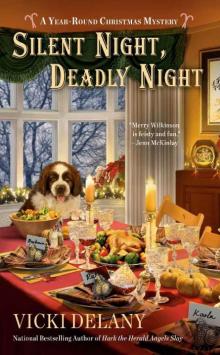 Silent Night, Deadly Night
Silent Night, Deadly Night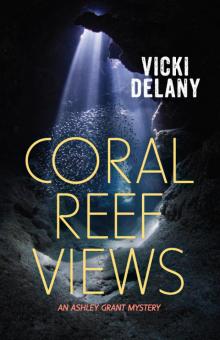 Coral Reef Views
Coral Reef Views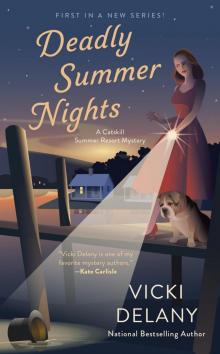 Deadly Summer Nights
Deadly Summer Nights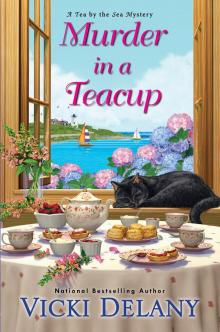 Murder in a Teacup
Murder in a Teacup Whiteout
Whiteout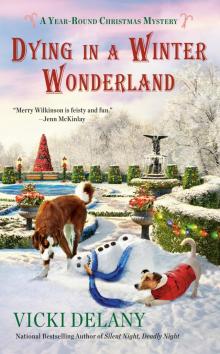 Dying in a Winter Wonderland
Dying in a Winter Wonderland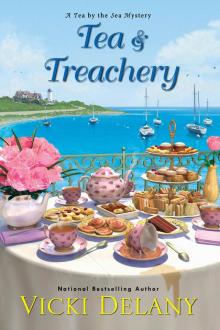 Tea & Treachery
Tea & Treachery Rest Ye Murdered Gentlemen
Rest Ye Murdered Gentlemen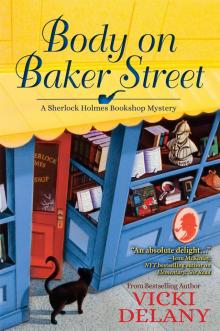 Body on Baker Street: A Sherlock Holmes Bookshop Mystery
Body on Baker Street: A Sherlock Holmes Bookshop Mystery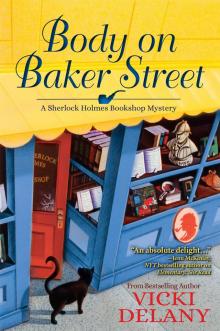 Body on Baker Street
Body on Baker Street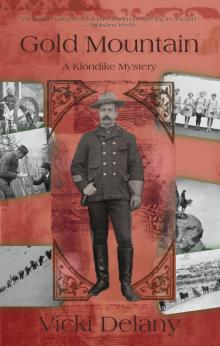 Gold Mountain
Gold Mountain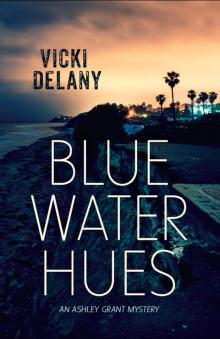 Blue Water Hues
Blue Water Hues Hark the Herald Angels Slay
Hark the Herald Angels Slay Murder at Lost Dog Lake
Murder at Lost Dog Lake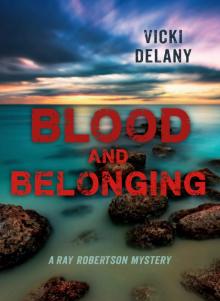 Blood and Belonging
Blood and Belonging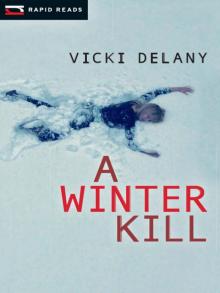 A Winter Kill
A Winter Kill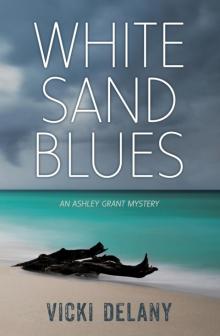 White Sand Blues
White Sand Blues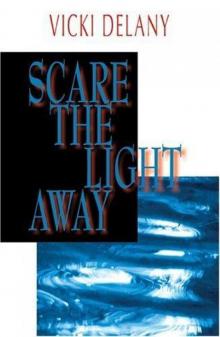 Scare the Light Away
Scare the Light Away Burden of Memory
Burden of Memory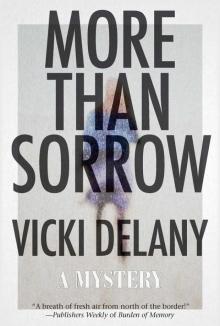 More Than Sorrow
More Than Sorrow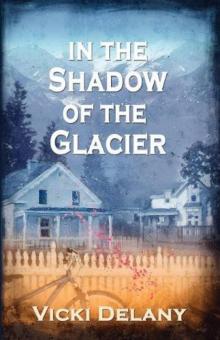 In the Shadow of the Glacier
In the Shadow of the Glacier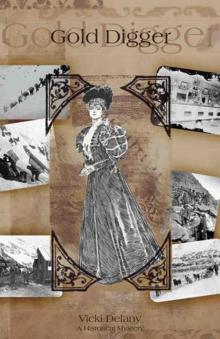 Gold Digger: A Klondike Mystery
Gold Digger: A Klondike Mystery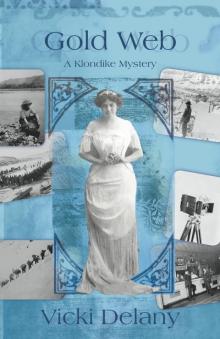 Gold Web
Gold Web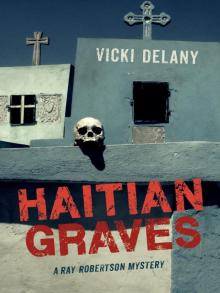 Haitian Graves
Haitian Graves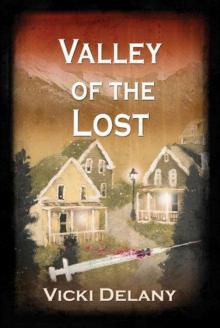 Valley of the Lost
Valley of the Lost We Wish You a Murderous Christmas
We Wish You a Murderous Christmas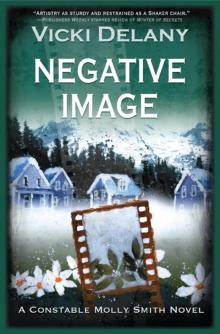 Negative Image
Negative Image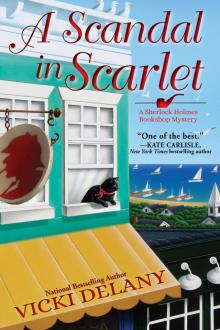 A Scandal in Scarlet
A Scandal in Scarlet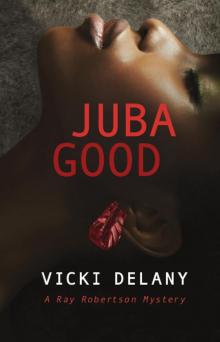 Juba Good
Juba Good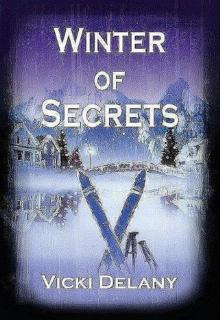 Winter of Secrets
Winter of Secrets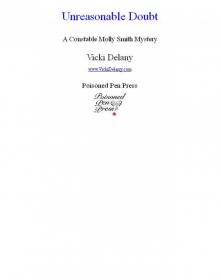 Unreasonable Doubt
Unreasonable Doubt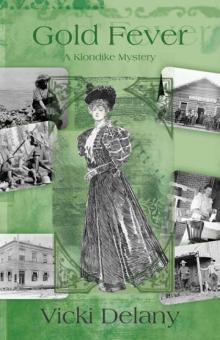 Gold Fever
Gold Fever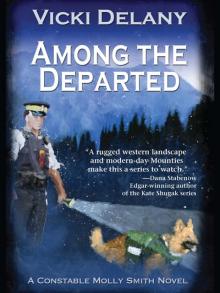 Among the Departed
Among the Departed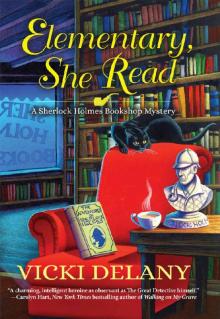 Elementary, She Read: A Sherlock Holmes Bookshop Mystery
Elementary, She Read: A Sherlock Holmes Bookshop Mystery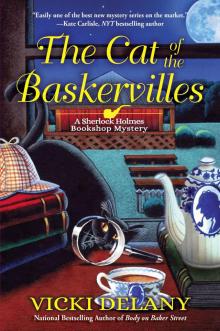 The Cat of the Baskervilles
The Cat of the Baskervilles